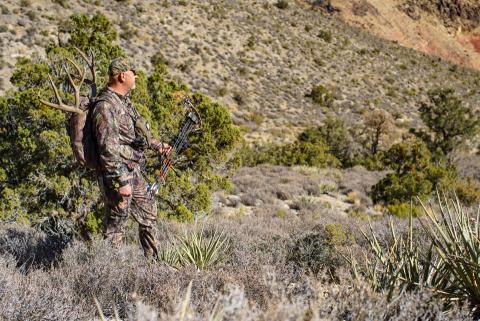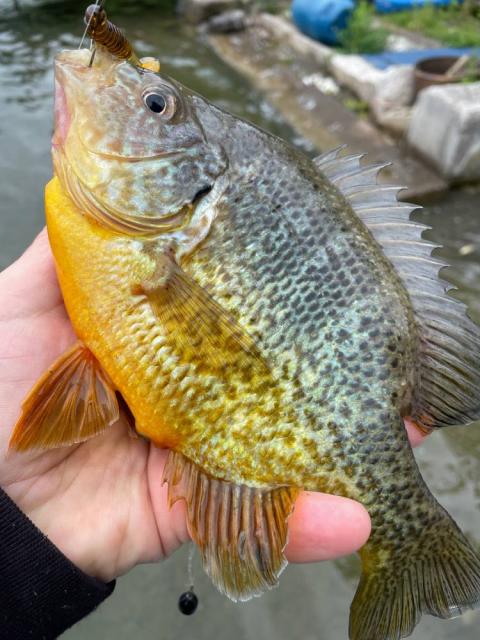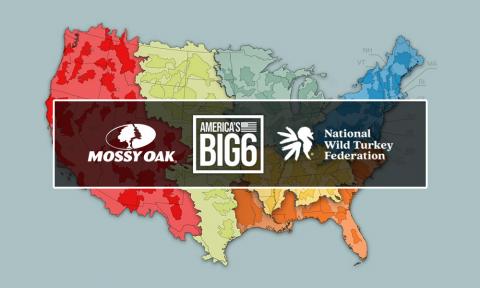Hunters have used man’s best friend as a hunting partner before the gun was even invented. There are different kinds of hunting breeds, and each breed is trained for a specific purpose. Some breeds are great for hunting small game, such as rabbits, while others are better for waterfowl.
Knowing what some of the most popular breeds of hunting dogs are and how to pick the right one can help you narrow down your choices and make it easier to find your perfect hunting partner. Mossy Oak GameKeeper Kennels specializes in breeding and training Labrador Retrievers. If that's your hunting dog breed of choice, check out Mossy Oak Kennels as a British Lab breeder/training facility. If you're still looking for a hunting dog breed to fit your needs, check out the other hunting dog options below.
Advantages to Hunting with Man’s Best Friend
Although another person can make for great companionship, dogs can offer advantages your hunting buddy can’t.
Hunters who want to spend more time hunting game rather than tracking it down and bringing it back rely on hunting dogs that are bred for pointing and retrieving.
Canines have a keen sense of smell and can find the downed prey much more efficiently than humans can. Hunting dogs can track down prey using their keen sense of smell even over rough terrain. In many cases, they can navigate difficult terrain with better efficiency than even the hunter can.
Finally, dogs make great companions, while still giving the hunter the ability to enjoy the peacefulness of the outdoors.
1. Labrador Retriever
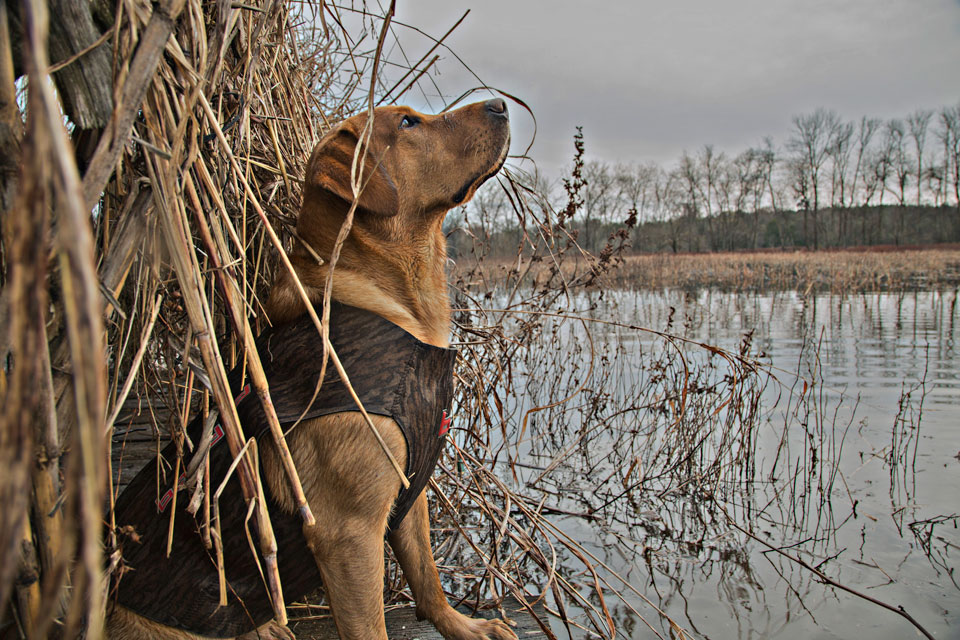
Labradors are one of the most widely recognized breeds of dogs. With their friendly, enthusiastic personality, they are one of the most versatile small-game hunting dogs. Duck hunting is the Labrador retriever’s specialty. Full of energy and equipped with a coat suitable for cold weather, Labradors go to great lengths to retrieve the kill.
Labradors are medium to large dogs and can weigh anywhere from 55 to 80 pounds. Their heads are broad, and their tails are thick and taper off at the end, which helps them easily navigate waters.
2. American Foxhound
Just as the name implies, American foxhounds were bred to hunt foxes but are now popular with deer hunters as well. This breed is extremely athletic, known for their incredible speed and willingness to hunt down any animal desired by hunters. They are even-tempered and low maintenance.
American foxhounds are considered medium to large dogs weighing in at 60 to 70 pounds on average.
3. Beagle
Small but mighty is a great way to describe the beagle.
Beagles are a great choice for hunting small game such as rabbits. They are determined, eager, persistent and seem to have an endless supply of energy. A beagle’s nose leads the way. Although a beagle can hunt alone, they also hunt well in packs.
Beagles are a smaller breed of dog and only stand about 13 inches tall. These dogs are easygoing and require training to listen to their masters instead of their noses.
4. German Short-Haired Pointer
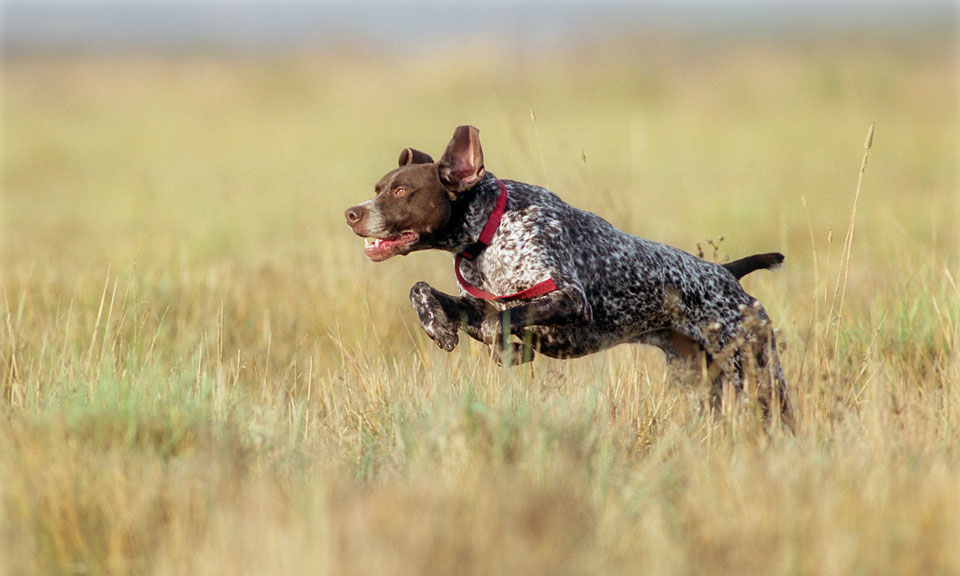
The German short-haired pointer is known for its hunting ability as much as its beauty. Just as the name suggests, this breed of dog points to game birds, alerting hunters to their position. They are great retrievers of game birds as well.
Pointers are great athletes and have great speed and agility. They can weigh as little as 45 pounds and as much as 75 pounds.
5. Bloodhound
Bloodhounds have an extremely keen sense of smell. They make excellent trackers, making them great companions for hunters who need to track down dying prey. Proper training is a must for this breed of dog, as their noses can most certainly get them into trouble and lead them astray.
This iconic breed is one of the largest hunting breeds, powerfully built and weighing as much as 110 pounds, making this the perfect breed for tracking over rough terrain.
6. Weimaraner
This elegant breed is great for hunting pheasant, quail and other game birds. Weimaraners are agile and possess great speed, and they can remain calm and composed during the commotion of a hunt. This is an extremely intelligent and obedient breed.
Weimaraners are a medium to large breed weighing anywhere from 55 pounds to 90 pounds.
7. Bluetick Coonhound
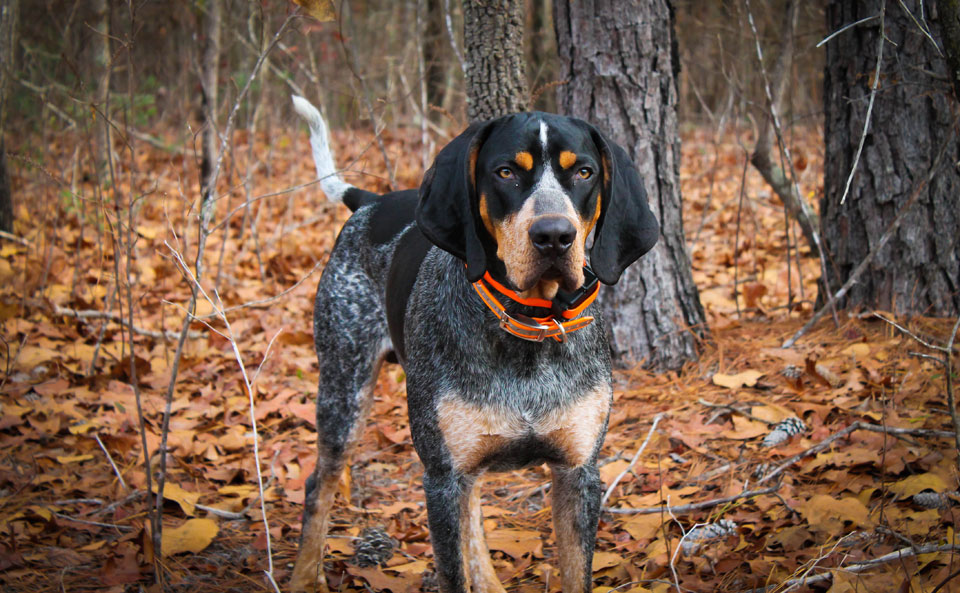
Coonhounds are bred to hunt raccoons and are notable for their hardiness, keen noses and ability to track for long periods of time over any type of terrain. This breed works well at night, which is important because their primary prey, the raccoon, is a nocturnal animal. Bluetick coonhounds have an extremely strong prey drive and must be trained to channel their energy appropriately.
Coonhounds can range from medium to large, with the largest males weighing as much as 80 pounds. Females tend to be smaller.
8. Irish Setter
Irish setters are widely recognized for their beautiful coat, but they are also great turkey hunting companions. This breed is known for speed, elegance and grace. This popular gundog is not only great for retrieving turkey but also waterfowl as well.
The average weight of an Irish setter is about 75 pounds. Males tend to be a little on the larger side, while females tend to be on the smaller side.
9. Plott Hound
Plott hounds are known for big game hunting, able to keep up on hunts for animals as big as bears. This breed is a strong, agile, fast and fierce hunting dog. Their endurance and versatility make Plott hounds the perfect breed for hunting over treacherous terrain.
Even though this breed is known for hunting some of the largest game, they are not one of the largest breeds of hunting dogs. Plott Hounds weigh anywhere from 40 to 60 pounds.
10. Brittany
Brittanys are popular bird dogs. This is a smaller breed, only weighing about 35 pounds. Brittanys are known for energy, athleticism and speed. This versatile gundog can hang with the best of them, with seemingly endless amounts of energy and determination. The Brittany is known as an extremely versatile hunter, great for retrieving waterfowl and small game.
Choosing the Right Hunting Partner
Research is important when it comes to selecting the perfect breed of dog as a hunting partner. Take into consideration what kind of hunting you plan to take your dog on. This is important, as different breeds are better suited for specific types of hunting.
Consider your own personality and the traits that are important to you in your new hunting companion. Thoroughly research the hunting abilities, personality traits, size and maintenance of each breed before settling on one. Choosing the wrong breed can lead to frustration for both you and your new companion. For example, a beagle may not perform well if bought for deer hunting.
Once you choose a breed, research lineages and breeders to find a line with your desired traits. You can either buy a puppy or a started dog, which is a dog that has already been taught some basic hunting skills. With the right dog at your side, you can start to form a lifetime bond that will stretch through countless hunting adventures together.














